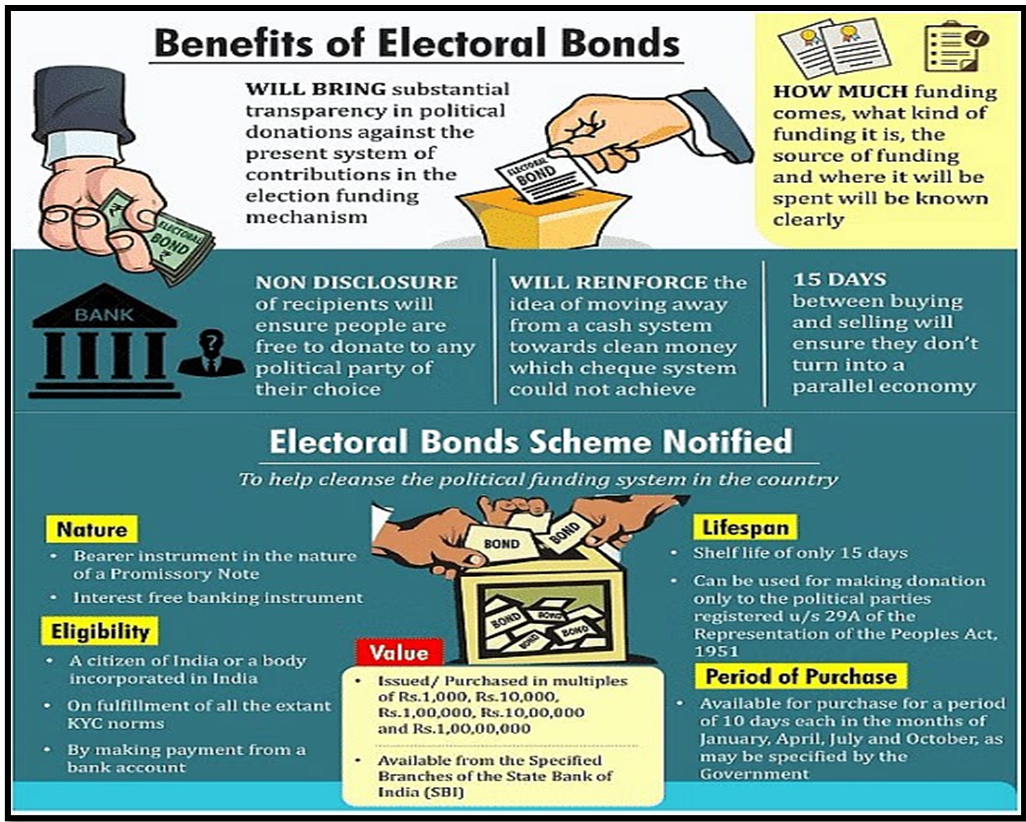ON THE BALLOT
Syllabus:
GS 2:
- Indian Constitution—
Amendments, Significant Provisions
- Government Policies
Why in the news?
Election Commission’s role in ensuring fairness amid controversies over electoral bond scheme, ECI appointments, and opposition concerns.
source:edurev
About the upcoming general elections:
- The 18th Lok Sabha general election spans seven phases over 44 days, emphasising the importance of a free and fair democratic process with vote counting set for June 4.
- The Election Commission of India (ECI) faces challenges amid concerns over fairness and transparency.
- Campaigning has become a constant in Indian politics, fueling discussions about ‘one nation, one poll’ advocated by the ruling BJP.
| Understanding Election Commission of India (ECI):
● Autonomous constitutional authority overseeing Union and State election processes in India. ● Established on January 25, 1950, under the Constitution, headquartered in New Delhi. ● Administers elections for the Lok Sabha, Rajya Sabha, State Legislative Assemblies, President, and Vice President. ● Not involved in panchayat and municipality elections, which fall under State Election Commissions. Constitutional Provisions: ● Part XV (Articles 324-329) govern elections and establish the Election Commission. ● Article 324 vests superintendence, direction, and control of elections in the Election Commission. ● Article 325 prohibits exclusion from electoral rolls based on religion, race, caste, or sex. ● Article 326 ensures adult suffrage for elections. ● Articles 327-329 grant powers to Parliament and state legislatures regarding elections and bar court interference. Structure: ● Originally a single-member body, now comprises the Chief Election Commissioner (CEC) and two Election Commissioners (ECs). ● State level aided by the Chief Electoral Officer. Appointment & Tenure: ● Appointed by the President as per the CEC and Other ECs Act, 2023. ● Fixed tenure of six years or until age 65, with salaries equivalent to the Cabinet Secretary’s. ● Removal through a process akin to Supreme Court judge removal for CEC, and on CEC’s recommendation for ECs. What are Postal Ballots? Purpose:
Distribution:
What is an Electronically Transmitted Postal Ballot System (ETPBS)? ● Developed by the Election Commission of India (ECI) with assistance from the Centre for Development of Advanced Computing (C-DAC). ● Facilitates entitled service voters to cast their votes electronically from any location, including outside their assigned voting constituency. ● Recorded the highest service voter turnout ratio during the Lok Sabha elections in 2019. About Voter Verified Paper Audit Trail (VVPAT): ● Voter Verified Paper Audit Trail (VVPAT) is an independent verification printer machine attached to electronic voting machines (EVMs). ● It prints a paper slip showing the chosen candidate when a voter presses a button on the EVM. ● The slip is displayed to the voter for seven seconds for verification before being cut and dropped into a drop box. ● Only polling officers can access VVPAT machines. |
About Appointment of ECI Members:
- Recent appointments of ECI members spark controversy, raising questions about the selection process’s transparency.
- Opposition voices concern over the prolonged poll schedule and the need for equitable representation in the electoral process.
About the ECI’s Role in Ensuring Fairness:
- Despite challenges, the ECI must ensure a fair electoral process and uphold public trust.
- Issues like the privacy of donors and voter information need resolution to strengthen trust in the electoral process.
About ECI’s Response and Expectations:
- ECI faces scrutiny regarding its credibility as a bipartisan body amid allegations of bias and lack of transparency.
- The ECI’s response to challenges, including dealing with fake news and hate speech, will determine its effectiveness in ensuring a fair democratic process.
Understanding the Electoral Bond Scheme:
- Electoral bonds are financial instruments similar to promissory notes.
- Purchasable by companies and individuals in India from the State Bank of India (SBI).
- Intended for donation to political parties, which can then redeem them.
Key Features:
- Purchase and Redemption: Bonds can only be redeemed in the designated account of a registered political party.
- Buyer Eligibility: Individuals can buy bonds singly or jointly with others.
- Transparency Initiative: Introduced to bring transparency to political funding in India.
- Government Objective: Described as an electoral reform to promote a cashless and digital economy.
Amendments Made in 2022:
- Extended Purchase Period: Introduced an additional 15-day period for bond purchase during general elections to state legislatures and union territories.
- Validity Period: Bonds are valid for 15 calendar days from the date of issue. Payment to political parties is prohibited after the bond’s expiry.
- Eligibility Criteria: Only political parties registered under Section 29A of the Representation of the People Act, 1951, and securing at least 1% of votes in the last general election are eligible.
About Electoral Bond Scheme Controversy:
- The Supreme Court’s declaration of the electoral bond scheme as unconstitutional highlights concerns over fairness in the electoral process.
- ECI faces the task of ensuring fairness amidst controversies surrounding the electoral bond scheme and its implications.
Challenges with respect to Electoral bonds:
- Transparency Contradiction: Electoral bonds contradict their intended purpose of transparency in election funding by allowing anonymity for donors, especially concerning opposition parties.
- Possibility of Extortion: Government’s knowledge of bond purchases via SBI opens avenues for extortion or victimisation of non-supporting companies.
- Democracy Compromise: Amendments exempting disclosure of bond donations undermine voters’ right to know, crucial in a representative democracy.
- Against Fair Elections: Anonymity benefits the ruling party, compromising the fairness of elections by enabling manipulation.
- Crony Capitalism: The scheme fosters crony capitalism by removing donation limits, allowing corporations to wield disproportionate influence.
- ADR Report Concerns: Shows a skewed ratio of electoral bond donations, particularly favouring the party in power, raising questions about fairness and influence in electoral financing.
Conclusion:
The ECI’s role in ensuring fairness and transparency in the electoral process is crucial for upholding democracy’s integrity. Addressing concerns and implementing measures to enhance transparency and fairness will strengthen public trust in the electoral system.
Source:
Mains Practice Question:
Evaluate the implications of the electoral bond scheme on democracy and electoral financing, highlighting concerns over transparency, accountability, and fairness. Propose measures to address these challenges and strengthen public trust in the electoral system.





